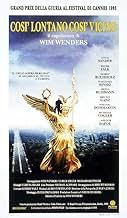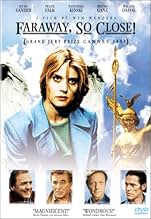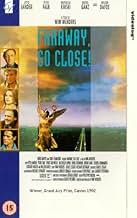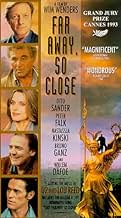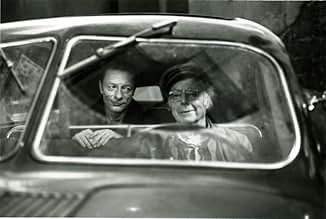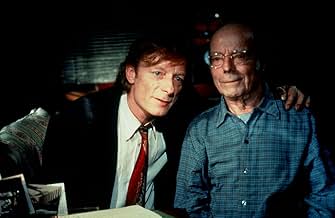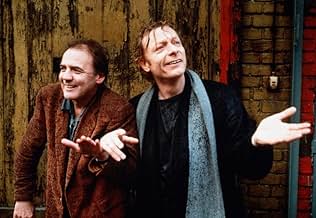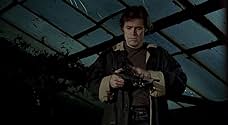IMDb RATING
7.2/10
9.5K
YOUR RATING
A group of angels in the German capital look longingly upon the life of humans.A group of angels in the German capital look longingly upon the life of humans.A group of angels in the German capital look longingly upon the life of humans.
- Awards
- 4 wins & 7 nominations total
Mikhail Gorbachev
- Mikhail Gorbachev
- (as Michail S. Gorbatschow)
Featured reviews
10Lulu-49
This movie is exceptional. It never fails to make me cry. It is a contemporary Epic Poem about an Angel who enters time and becomes human in order to become more skillful at his eternal task. It is long (nearly 2.5 hours) and probably a little challenging for short attention spans. The cinematography is stunning. The script is incredibly complicated with hidden messages and multiple levels of symbolism. It won the Prix du Jury at Cannes (1993). It doesn't suck.
10Firas
I can say this movie is one of the best movies I have ever watched (and I watched a lot of them). The roles were very well interpreted by good actors. Even when they are no actors at all, as Mikhail Gorbachyov who appears in a scene. Many things make this movie special. In it five languages are being spoken. Nevertheless it doesn't really matter. The protagonists can understand what is being said as though language difference is not that relevant for humans to understand each other. The pictures are the usual great Wim Wenders pictures. Black and white pictures indicate the coolness of the world of angels while colors indicate how colorful the world could be for humans (if they can see it!). It is an analysis of the relationship of man with the world around. Humans think that they are controlling the world, but the world is controlling their lives in fact. It shows how blind we can be in contemplating the beauty of the world around us. In this matter one could mention the movie called "The awakenings" (1990) although the two movies are in most aspects different. It is a movie about an angel who wants to become human in order to be able to understand humans, and how he gets into a complicated life. It helps a lot to see "The wings of desire" where the story between angels and humans started. Some things are hard to understand when you don't know the first movie. This movie is also an analysis of time. Emit Flesti (read backward Time itself) is a very interesting character that can communicate with both angels and humans, and who speaks about almost always about time and its meaning. For me he was also a mix of Lucifer and the death angel as well. The background of the whole story is Berlin after the fall of the wall, whereas "The wings of desire" took place before the end of the cold war.
This movie makes a genius use of fantasy to analyze our lives. Its main message is : "We (the angels) are not the message. We are the messengers and the message is love".
This movie makes a genius use of fantasy to analyze our lives. Its main message is : "We (the angels) are not the message. We are the messengers and the message is love".
I recommend this film to all the jaded and cynical people of the world. It will touch the core of your heart and give you a spiritual yearning for that which we cannot see. When Cassiel falls to earth he can finally touch, feel, hear and experience the feelings of loneliness and joy. He finds his existence on earth in Berlin difficult and finds it hard to comprehend the swift passing of time and the limited outlook of the individual who can only see their own reality in how it affects them. Natassja Kinski who plays Angel Raphaela is on hand to offer comfort and solace to Cassiel when he begins to despair. The sweeping contrasts between black & white and colour add profound depth to this movie, as do the real people who play themselves : Gorbachev, Lou Reed and Peter Falk. Wim Wenders who directed this movie is a foresighted genius of compassion and ethereal visions.
This film is about passion. A flicker on the eyes of an angel, our brief lives are as unique and intense as they are ephemeral, and time itself is the fire that burn our passions and desires. Complex and multicultural, the film is disturbingly deep as it is light, a contrast of innocence and evil, showing how the Faust compromise can be present and right/wrong can become difficult to define. Also, the participation of Lou Reed and Peter Falk as themselves bring Faust to reality, as a mirror to ourselves. The deeply german Wenders pay a compliment to Gorbatchev for the fall of the Wall, maybe telling us the duality of time, that can be good and evil like the faces of a coin. Wonderful piece of art.
It's difficult to make a sequel as good as the original. If it's done in the same style, it becomes a poor shadow. Here, Wim Wenders has made something different than in "Wings of Desire:" what I consider a comedy of a misfit ex-angel, to counter the desire of an angel to become human in the other film.
Near the end of the other movie, we saw one of the angels, Damiel, become human for the love of a beautiful trapeze artist. In this film, we see the other angel, Cassiel, become human by accident as he wanted to help people. As much as he wanted to fit in with our world, the more he tried to do good, the worse trouble actually made of things. He often quotes the Lou Reed song he heard: "Why can't I be good, make something of this life?"
There is a cameo appearance of a world leader, when Mikhail Gorbachev (filmed the summer after resigning as Soviet president) ponders the age-old question about the meaning and purpose of life; or two leaders if counting that the guard dog's name is Khadafy. There are jokes about getting lost between East and West, since the Wall no longer was there as a landmark. But there is the serious side at the beginning, of the war and the Nazi past, which is a little hard to follow. I almost forgot about it as I got caught up in the humor of the fallen angel, but even that had the darker side of an evil angel who was leading him astray. Yet the ending tied everything together nicely.
Like "Wings of Desire," there are nice transitions between black and white, which is how the angels see the world, and color, for how humans see things. There is also a poem started at the beginning, about humans being everything to the angels, when Cassiel looks down from the statue to "you whom we love." The angels are just the "messengers who bring light to those in darkness." The poem is repeated at the ending, adding that the message is love.
The angels lament that humans can only believe what they can see and touch. The Wall fell, the tangible symbol of the division between East and West, yet still one driver whose thoughts we heard couldn't see what the difference was between the two areas; freedom can't be seen or touched. Love, the angels message, can be neither seen nor touched, yet that, and not "blood and steel" (as said the Russian poet and diplomat that Gorbachev quotes), is what is needed for there to be peace.
Near the end of the other movie, we saw one of the angels, Damiel, become human for the love of a beautiful trapeze artist. In this film, we see the other angel, Cassiel, become human by accident as he wanted to help people. As much as he wanted to fit in with our world, the more he tried to do good, the worse trouble actually made of things. He often quotes the Lou Reed song he heard: "Why can't I be good, make something of this life?"
There is a cameo appearance of a world leader, when Mikhail Gorbachev (filmed the summer after resigning as Soviet president) ponders the age-old question about the meaning and purpose of life; or two leaders if counting that the guard dog's name is Khadafy. There are jokes about getting lost between East and West, since the Wall no longer was there as a landmark. But there is the serious side at the beginning, of the war and the Nazi past, which is a little hard to follow. I almost forgot about it as I got caught up in the humor of the fallen angel, but even that had the darker side of an evil angel who was leading him astray. Yet the ending tied everything together nicely.
Like "Wings of Desire," there are nice transitions between black and white, which is how the angels see the world, and color, for how humans see things. There is also a poem started at the beginning, about humans being everything to the angels, when Cassiel looks down from the statue to "you whom we love." The angels are just the "messengers who bring light to those in darkness." The poem is repeated at the ending, adding that the message is love.
The angels lament that humans can only believe what they can see and touch. The Wall fell, the tangible symbol of the division between East and West, yet still one driver whose thoughts we heard couldn't see what the difference was between the two areas; freedom can't be seen or touched. Love, the angels message, can be neither seen nor touched, yet that, and not "blood and steel" (as said the Russian poet and diplomat that Gorbachev quotes), is what is needed for there to be peace.
Did you know
- TriviaMikhail Gorbachev: only appears because his secretary was familiar with the movies of Wim Wenders and was a great admirer. She talked Gorbachev into giving up a couple of hours to do the cameo as he was on a trip to Germany anyway.
- GoofsAfter Cassiel meets Anton Becker and returns to Angelo's pizzeria, he meets Emit Flesti and Damiel puts his flour stained hands on Flesti's shoulder, leaving a white mark on the black suit. The next time we see Flesti, moments later, there is no white mark.
- Quotes
Emit Flesti: Let me explain a couple of things. Time is short. That's the first thing. For the weasel, Time is a weasel. For the hero, Time is heroic. For the whore, Time is just another trick. If you're gentle, your Time is gentle. If you're in a hurry, Time flies. Time is a servant, if you are its master. Time is your god, if you are its dog. We are the creators of Time, the victims of Time, and the killers of Time. Time is timeless. That's the second thing. You are the clock, Cassiel.
- Crazy creditsThe film is dedicated to actor Curt Bois who worked with Wim Wenders in "Der Himmel über Berlin".
- Alternate versionsThe original running time at the world premiere in Cannes in May 1993 was 165 minutes. Despite winning the 'Grand Prize of the Jury' for this version, the director re-edited the film to make it shorter and improve the narrative. Unfortunately, the original version was never released again, so the Cannes reviews are actually about a slightly different film, than the 146 minutes version we know today.
- ConnectionsFeatured in U2: Stay (Faraway, So Close!) (1993)
- SoundtracksBerlin
Written and Performed by Lou Reed
- How long is Faraway, So Close!?Powered by Alexa
Details
- Release date
- Country of origin
- Languages
- Also known as
- Faraway, So Close!
- Filming locations
- Sophienkirche, Große Hamburger Str. 29-30, Mitte, Berlin, Germany(background exterior, Cassiel and Damiel walking to his restaurant)
- Production companies
- See more company credits at IMDbPro
Box office
- Budget
- $10,500,000 (estimated)
- Gross US & Canada
- $810,455
- Opening weekend US & Canada
- $55,019
- Dec 26, 1993
- Gross worldwide
- $810,455
- Runtime2 hours 26 minutes
- Color
- Sound mix
- Aspect ratio
- 1.66 : 1
Contribute to this page
Suggest an edit or add missing content



